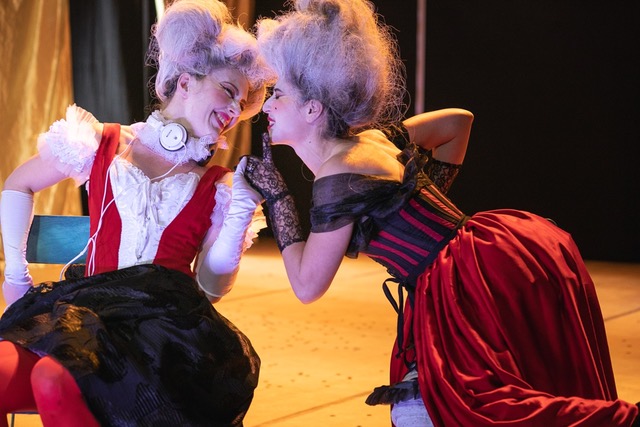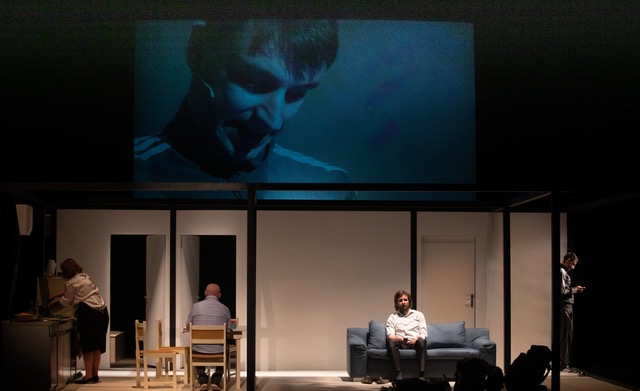Ivana Vuković is a playwright, screenwriter and dramaturg from Split whose work has appeared at Zagreb Youth Theater (ZKM), the Marin Držić Theatre in Dubrovnik, and KunstTeatar. She speaks to Lucija Klarik about dramatizing Croatia’s housing crisis and the need for artistic solidarity.
Lucija Klarik: Your play 55 square meters deals with housing and tourism in Split. How did the local audience in Split react to a text dealing with these matters?
Ivana Vuković: The housing problem, especially when it comes to young people, was something that was very important to me. The play was written in 2018. when my generation was exiting the educational system and becoming completely independent in the full meaning of the word. People were starting to move out of their parents’ houses, finding regular jobs and, in this process, they were facing a wall: they weren’t able to have an apartment during the whole year.
This was interesting to me as a social phenomenon: on the one side, the society keeps on calling out our generation as being lazy and spoiled and on the other hand, when these same young people finish colleges, find jobs, find life partners, do everything that the society prescribes as normal for growing up, society doesn’t [allow them to] secure a life in the same apartment for the whole year. This is especially emphasized in Split.
When I began studying in Zagreb, Split was still a “normal” city which was only transitory for tourists in the summer. But, in a few years, a shift happened and suddenly everything in the city was connected to tourism. I wanted to question how can this conditioning from the city influence the micro-community of the family.
Unfortunately – or at least unfortunately for our society, but luckily for the show – the reaction of the audience was: “This is us”. What was relevant for me was that people look at the other side of the coin. Often people in the south of Croatia tend to comfort themselves about the poor quality of life in the city saying “let the tourist come, it’s profitable for the whole town”, but when you pose them a single question of – “all right, but how did this exactly [improve] your life?”, only silence can be heard.
Interestingly, the critics in Split weren’t thrilled by our show. This is mostly because we offered something that wasn’t done before in the Croatian National Theater in Split. One indicative example is the different reactions to the fact that we have a cameraman on the stage and live video projection. This camera enables us to see details, close-ups of the actors and things we don’t usually see. The critics strongly opposed this because for them it was impossible to track the two parallel planes.
On the other hand, the audience found this element of the show the most fascinating. They intuitively comprehended the intention behind this concept and that on the outside we are seemingly talking about nothing but that on the inside, there ate a lot of things going on. This discrepancy between the critics and the audience was quite entrancing to me and, in a way, I’m glad we won [over] the public as opposed to the critics in Split.

Amfitrion Photo: Archive Kazališta Marin Držić
Lucija Klarik: In your opinion, should national theaters bear more responsibility in providing productions of authors and plays which are dealing with the immediate problems of the local audiences? Is there, in your view, a duty for institutions to put young and in general, contemporary authors on the programme?
Ivana Vuković: Unfortunately, I think the programming of the National Theater has mostly come to entertaining the audience. I’m not excluding the possibility that theater could be done for pure fun and pleasure but this shouldn’t be the only thing and it certainly shouldn’t be the role of the national theater to produce this type of content.
It’s problematic for Split that besides the national house, we have the City Youth Theater which suffers from [low] funding and a City Puppet Theater while the independent scene is very weak. There’re no more than two productions on the independent scene per year and this is terrifying.
The audiences in Split truly do come to watch everything that’s on the repertoire so this audience indulging is merely saying – this is what you, as an audience, deserve and the only thing you can understand. Of course, that’s not true and persistently, we witness that when something that dares to do something different in the context of the local scene, becomes exciting for the audience. What was great for them were the things that they didn’t have a chance to see [before]. We are all going to get suffocated by heritage and tradition which is always pushed to the forefront and gets a big chunk of funding, leaving little space for contemporary performance. It brings us to a point where there’s no space to get involved with current topics and local problems because only a small gap is left into which you really need to squeeze.
In a way, it’s all a question of cultural policies – this insistence on Shakespeare and Smoje being a part of the programme every season. I’m not saying anything against these authors but we also have the voices of today: real living writers. Maybe it would be interesting to see what they have to say and stop shoving our contemporary worldviews into, for example, Midsummer’s Night Dream?
There’s the famous sentence: “We don’t want to take a risk so we put on the classics”, which I think is a bit crazy. The directors of theater institutions say that, but at the same time insist that you do a “contemporary reading” of the canon. But what are we doing then? Why are we pushing the topics of our time into Shakespeare or Moliere?
I found myself in this [predicament] when I was working on a production of Amphitryon in Dubrovnik. The key to my adaptation was to free the female characters of the position of the victim and allow them to partake in the scheme, even be a bit above it all. But when we finished the production, I found myself thinking: did I just rewrite history which bears witness to the fact that women were victims of men’s doings? Do I have the right to do that? And did I do Moliere a favour by doing this or not, by incorporating feminist thought into something that’s pure chauvinism from our perspective?
On the other hand, if I’m doing Amphitryon in 2020., I cannot have female characters who are so insignificant on stage because then it’s a matter what of what are they but pretty costumes? Of course, Moliere was a theater genius. But, in my view, you shouldn’t be taking Moliere’s text and then modernizing it. Rather take the idea of reacting to criticism in 24 hours and see what happens with this concept today.
Unfortunately, in our theater context, it’s usually taking Moliere as it is and then putting a bit of our own time in it, hoping that maybe someone will notice this intervention. And this is only done so we can have placards which say – Moliere or Shakespeare or Chekhov or Ibsen. In the end, the poster in Dubrovnik poster stated “Ivana Vuković according to Moliere” and I was still looking at it and wondering – but, what does that mean?
Lucija Klarik: What are the differences for you when you’re working on a devised performance and when you’re the sole author of a drama text?
Ivana Vuković: In my playwriting I tend to deal with the questions I don’t have an answer to. If I find the answer somewhere in literature or in a movie, in another show, I let it go. But if I can’t find it, then it’s something I start to write about.
When I write, I never think about the final performance. For me, the text is happening in the time and space of the text. When I wrote 55 square meters I was literally imagining a family, on the ninth floor of a skyscraper in Split. I wasn’t picturing a theater stage because that tends to limit me and I get too involved with how could something be performed, which I don’t think is the job of the writer.
In playwriting I take into account that this is something that will be read first. A play has its surpluses which are crucial to me as a writer but can also be of use to anyone who decides to put on the text. In a way, I write when I want to tangle with something so personal that I’m probably not ready to share the process with anyone else.
When it comes to devised projects, the text is secondary. The focus is on the performance and in that case, I’m more interested in the theatricality of things and how can we play with different theatre elements or procedures. There’s also the question of time. Time’s something that cannot be put on paper. Duration, in a performance, can produce everything and more. All of the textual material that is put together in devised processes is not something I could write on my own because it’s something that’s conditioned by certain performance procedures that cannot be written into a text.
In devised theater we often don’t have a clue what the end result will be and because of that we are free to spend four weeks playing around and gathering material. Only then do we return this material, that we produced spontaneously together, to the performers in a structured manner.
What becomes a challenge for me is how can I give them back their own material and how they can find a way to not play the memory of the improvisation but rather to keep a freshness in the performance. This is something that occupies me because it’s very fragile and I’m still learning how to handle it.
In a devised process, I have to be very active and ready to react to the things that the performers offer me, as quickly as they react to the tasks. What’s tricky with improvisation is that it’s always the best the first time. I have to be far closer to the performers than when we have a text. But that’s something that I find the most beautiful about our job. The fact that you are always searching for what is your job on a certain project as a dramaturg and then you fulfil it.

55 kvadrata Photo: Matko Biljak
Lucija Klarik: You’re very active when it comes to fighting for the working rights of artists as a member of the professional association SPID (Croatian Screenwriters’ and Playwrights’ Guild). Where do you see space for improvement in the working conditions of young dramaturgs and playwrights?
Ivana Vuković: I entered the guild when I was still in college and then, step by step, became a member of the steering committee, worked as the administrator of the association, and was very active, especially during the pandemic and the lockdown. I became aware of the conditions in our field. This requires an openness to admit to yourself that you are working in a field with terrible conditions. You can easily associate yourself with that – thinking that you’re a loser because you entered a professional field that’s struggling at best. I think what we must do is to own that space and tell ourselves that we want to belong to this field and that it is ours but that we also want to change the state it is currently at.
By coming to terms with this, I [acquired] a great deal of confidence in what I do and what I think are good terms for work and how can I ask for them. Without that information, you cannot really sit and negotiate your fee or the terms because you don’t know what you are asking for. And there’s that trap we all fall into: we think we should just be grateful that we even have the chance to work.
In Croatia there isn’t a place which you conquer and then you can relax. One day you can have a performance in the National Theater in Zagreb, but that is not a guarantee that you will have a peaceful career and life after that and that things will just come to you.
Thanks to the randomness of putting together programmes and repertoires and consequently, getting opportunities, you are continuously in this state of tension and caution that you don’t get into a position where you will not be able to keep on working.
Discontinuation in your practice is something that can hurt your self-esteem and artistic development. Maybe you can find a bit of peace of mind when you are renowned but I found that’s also a myth. Our path at SPID is to start a conversation and make people aware that it can be better and that the key for that is solidarity. By solidarity I mean the fact that I don’t accept bad terms myself – not just because of me but because of my colleagues too – that we warn each other about bad experiences and share the good ones.
One plus for dramaturgs is that we lack the competitiveness that directors have. Because of the underdog position into which we are often put, we tend to be in solidary with one another and this is something we should keep at all times because it makes us stronger.
I dream of a world in which I turn down a project because the offer is terrible and everybody else after me does the same. The same goes for the other way around. That would be a fantasy because only then can we talk about real change and about making the sentence “if you won’t do it, there’s someone who will” disappear.
Main image: Ivana Marinić Kragić
Further reading: What a Way to Make a Living: Feminist dramaturgy in the Western Balkans








